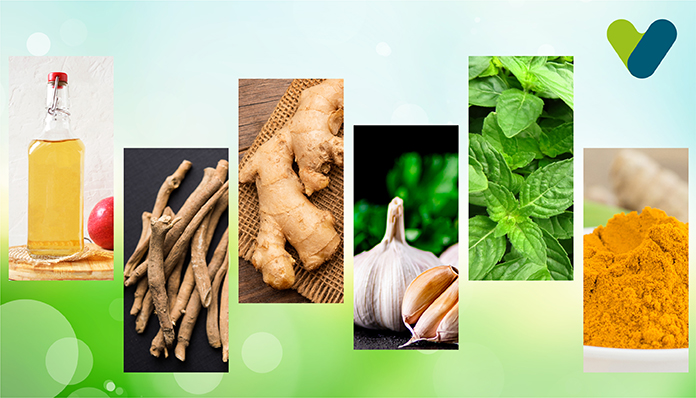Fever is a common sickness that affects both adults and children these days. One of the risk factors for viral fever during this season is a change in climate and a temperature rise. Airborne infections, which we obtain through the air we breathe and can be transmitted from an infected person, are the most common causes of viral fever. Many viral illnesses can affect humans, from the common cold to the flu.
Mild fever or a low-grade fever is the most common sign of many viral infections. Symptoms of viral fever include a sore throat, cough, runny nose, and body aches. A minor viral fever can be treated at home by eating a well-balanced diet that includes lots of comfort foods, drinking enough fluids, and getting enough rest. Fever has a wide range of causes because it is merely a symptom of a more serious underlying ailment. In most situations, however, a fever results from the body's immune system reacting to an infection or toxins. The most ubiquitous infections are ear, nose, and throat infections, the most common causes of fever.
The Ayurvedic medical practice is based on the notion that there are five components in the universe: air, space, fire, water, and earth. These five elements are supposed to make up your body's three components (doshas), and illness occurs when these components become imbalanced. According to a reliable source, ayurvedic medicine is an excellent cure for any health problem, even common illnesses like the common cold and flu.
List of 6 Ayurvedic medicine for the fever to know about
Apple Cider Vinegar(ACV): Apple cider vinegar is a good fever cure. The vinegar's somewhat acidic composition aids in the removal of heat, resulting in a cooling effect. The vitamins and minerals in ACV also help replace the body's mineral stores, frequently depleted by pollutants. To get the best results, combine two tablespoons of apple cider vinegar and one tablespoon honey in a glass of water and drink it at least two to three times a day.Ashwagandha: This Ayurvedic plant, which includes magical abilities to treat the body of infections and symptoms of cold, cough, and viral bugs, is now selling like hotcakes all over the west. While ashwagandha should be ingested regularly to naturally boost immunity, the start of a sudden cold illness should prompt you to increase your ashwagandha dosage to three times per day, in powder or tablet form. The herb's inherent immuno-boosting characteristics can also help treat persistent stress and exhaustion that can accompany viral infections.
Ginger: Ginger has been shown to help with various health issues, including colds, flu, inflammation, sore throats, and fevers. Its antiviral and antibacterial properties assist your body fight infection and boost your immunity from within. You can drink it as a tea by combining 1 1/2 teaspoon grated ginger with 1 cup boiling water. To make it more flavorful, add some honey and drink it three or four times a day. Alternatively, 1 1/2 teaspoon ginger juice, one teaspoon lemon juice, and 1 tablespoon honey can be combined. For optimal effects, drink this mixture two to three times each day.
Garlic: Garlic has numerous antimicrobial properties. Allicin and diallyl sulfides-sulfurous chemicals that are antibacterial and antifungal are the principal beneficial elements of this allium family member. Garlic's warm nature can help to reduce a high fever by encouraging sweating. One garlic clove, crushed, in 1 cup of hot water. Allow yourself 10 minutes of resting time before straining. For optimal effects, drink this twice a day.
Basil: Basil is an effective herb for bringing down fever. This herb is just as effective as many types of antibiotics on the market. Its healing properties will help reduce fever very quickly. Take about 20 basil leaves and boil them, now. Add one teaspoon of crushed ginger in the strained tulsi water, and boil until the solution gets reduced to half. Add a little honey and drink this tea two or three times a day for three days to get relief.
Turmeric: Turmeric is a traditional spice that has long been used to treat infections. Our elders have been doing this for a long time and have encouraged us to do the same. Antioxidants and vitamins may be found in a simple turmeric paste produced from turmeric powder and raw organic honey, which can help fight viral fever. To make the paste even more effective and valuable, try adding additional excellent kitchen products like ghee, black pepper, or mishri (rock sugar).
Ayurvedic herbs are an essential component of the ayurvedic treatment system. Since ancient times, we've been using these herbs to treat various disorders, increase mental clarity, boost immunity, and maintain good skin and hair. A patient can be treated as a complete, not simply a diseased component, in Ayurveda. Ayurveda has employed thousands of plants to treat sicknesses, with active ingredients from leaves, roots, flowers, and bark. Herbs can bring the mind and body into equilibrium.
While these natural fever treatments may be among the most effective ways to break a fever without resorting to medication, they are only a few of the many natural options available, including popular fever-reducing foods and plants such as cilantro basil, and garlic. It's crucial to remember, though, that your overall diet should be light and easy on your system while still delivering essential nutrition. Most importantly, drink enough water to avoid being dehydrated. If your fever does not respond to home therapy or rises above 103 degrees Fahrenheit, see your doctor as soon as possible.


